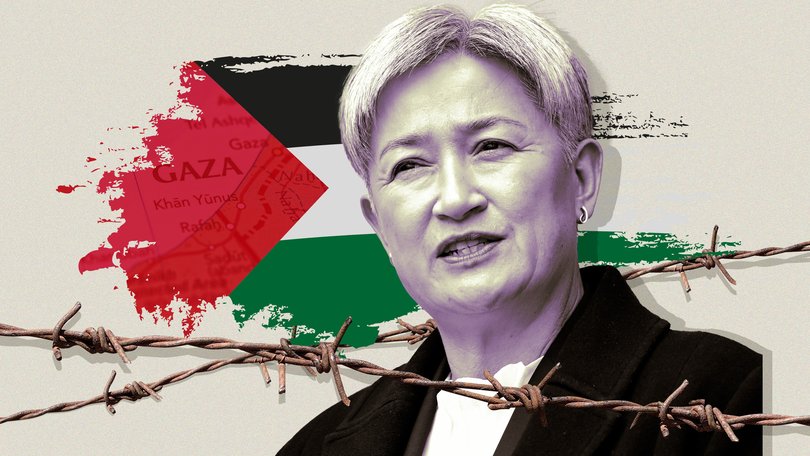Penny Wong can’t answer the pivotal question about her Gaza peace plan
AARON PATRICK: Australia’s recognition of a state of Palestine is predicated on the removal of Hamas from power. The Foreign Minister can’t explain how that would happen.

When Foreign Minister Penny Wong was asked the pivotal question about her Government’s recognition of a Palestinian state - why would Hamas give up power? - the woman who spent more than a year working on a historic shift in Australian policy had no answer.
“I speak for Australia,” she told Sarah Ferguson on the 7.30 program Monday evening.
“We are working to deliver a change in the cycle of violence that we have seen, and to work with others to try and provide some hope in what has been a very dark time.”
Sign up to The Nightly's newsletters.
Get the first look at the digital newspaper, curated daily stories and breaking headlines delivered to your inbox.
By continuing you agree to our Terms and Privacy Policy.Senator Wong, though, was clearer about another crucial point: Australia’s recognition is not conditional on any actions by the Palestinians. The decision has been made, come what may.
There was a different emphasis earlier Monday, when Anthony Albanese referred to the “conditions” he had placed upon the Palestinian Authority’s leader, Mahmoud Abbas.
The Prime Minister said Mr Abbas had promised to reform the corrupt but largely compliant institution, which Australia will, in a month’s time, consider represents a new country, the State of Palestine.
“And the conditions are ones that are consistent with the declaration in June, that recognition of the State of Israel, which of course the Palestinian Authority would argue had occurred with the Oslo Accords,” Mr Albanese said.
He was referring to a letter sent in June by Mr Abbas to French President Emmanuel Macron that said: “Hamas will no longer rule Gaza and must hand over its weapons and military capabilities to the Palestinian Security Forces.”
Mr Abbas said he was “ready to invite Arab and international forces to be deployed as part of a stabilisation/protection mission with a (UN) Security Council mandate”.
Power over Gaza
In other words, the nominal Palestinian leader was asking for the international community to give him the Gaza Strip, from which the Palestinian Authority was violently ejected in 2007. Rather than the agreement towards peace Mr Albanese portrayed the conversation as, Mr Abbas seems to have repeated the offer he made to Mr Macron.
On Monday, two months after the French president posted Mr Abbas’ Hamas denunciation on X, Mr Albanese claimed credit: “This is one of the commitments Australia has sought – and received – from President Abbas and the Palestinian Authority.”
Mr Albanese’s grasp of the intricacies of Middle East politics, and geography, has been questioned by people who have discussed the region with him in private. On Tuesday, appearing on the Sunrise program, he did not appear to know or remember that Israel abuts the Mediterranean Sea.
“Hamas don’t support two states,” he said. “They support one state. In their own words, ‘from the river to the sea’, from the Jordan river to the ocean.”
Arab call
In the US, a Democratic diplomatic veteran of the conflict did not agree with the switch. Former US Secretary of State Antony Blinken said recognising a Palestinian state before Hamas was removed “would fortify proponents of terror on the Palestinian side and rejectionists of Palestinian statehood on the Israeli side.”
Mr Albanese and Ms Wong say their decision was influenced by a call from 22 Arab countries on July 31 for Hamas to stop fighting and release its hostages. As anti-Israel fervour swept through the streets of the Western world, the Arab position was seen as tacit recognition of Hamas’s responsibility for the war.
The Arab’s position showed that Hamas is being isolated, and a combination of Western pressure on Israel’s right-wing government and international support for the Palestinian Authority could help remove it from power, end the violence in Gaza and bring peace closer, Mr Albanese and Ms Wong argued.
“We need to make sure that Hamas is isolated,” the Prime Minister said on Monday.
“The comments by Arab League nations have made it clear that that is their position as well.”
There’s an important problem with the position. Hamas is not an Arab-sponsored organisation. It is funded by Iran, the Persian power seen as a destabilising force across the Middle East by most Arab leaders.
Iran’s Islamist leaders are extreme anti-Semites impervious to Arab pressure. Why they would stop funding their Hamas proxies in a war against what they call the Zionist Entity is unclear.
Without Iranian pressure, why Hamas’s remaining leaders would retire from war and politics is a question not even Australia’s formidable Foreign Minister could answer.
Possible negotiations
Amid arguments about the pros and cons of international recognition, less symbolic steps towards peace seem to be happening.
A regional media outlet, Sky News Arabia, reported Egypt, Qatar and Turkey are drawing up a cease-fire and hostage-release for consideration by Hamas. The deal would require the release of all hostages, and the bodies of some who have died, in exchange for Palestinian prisoners. The Israeli army would move to less aggressive posture and Hamas fighters would pause attacks while negotiations were held for a permanent cease-fire.
The impetus for the renewed peace effort appears to be a desire to avoid another mass Israeli incursion into Gaza, which Prime Minister Benjamin Netanyahu foreshadowed on Sunday. Which suggests that, sadly, violence rather than talk can bring an opponent to the negotiating table.

